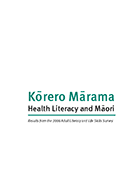
Summary
The report describes the health literacy skills of Māori compared to non-Māori. Data in the report are sourced from the 2006 Adult Literacy and Lifeskills Survey (ALL) that New Zealand participates in along with other OECD countries. Health literacy is defined as the ability to obtain, process, and understand basic health information and services in order to make informed and appropriate health decisions.
The report found that Māori have poorer health literacy skills compared to non-Māori across all of the measured variables. Eighty per cent of Māori males and 75 per cent of Māori females were found to have poor health literacy skills. On average, New Zealanders have poor health literacy skills.
The report presents findings by gender, rural and urban location, age, level of education, labour force status, and household income.
